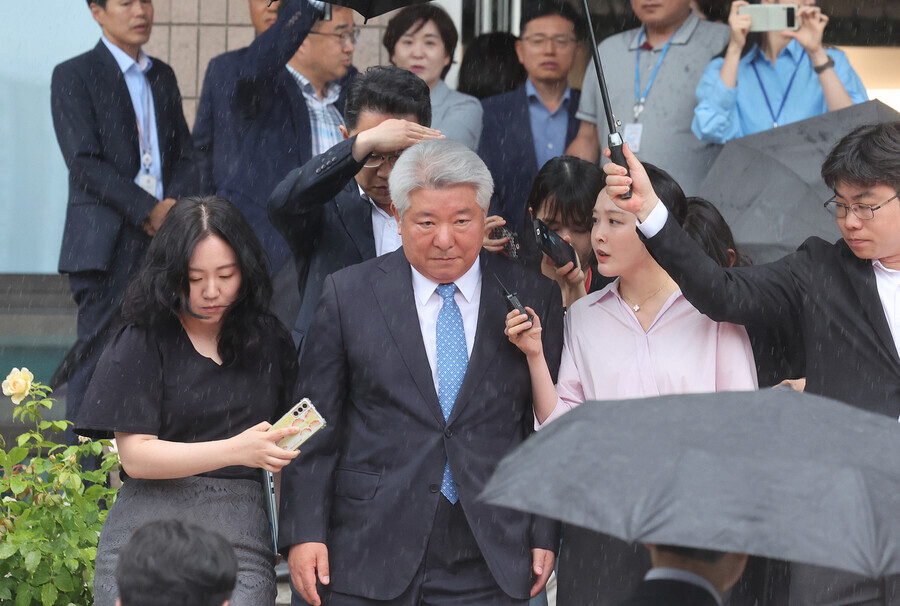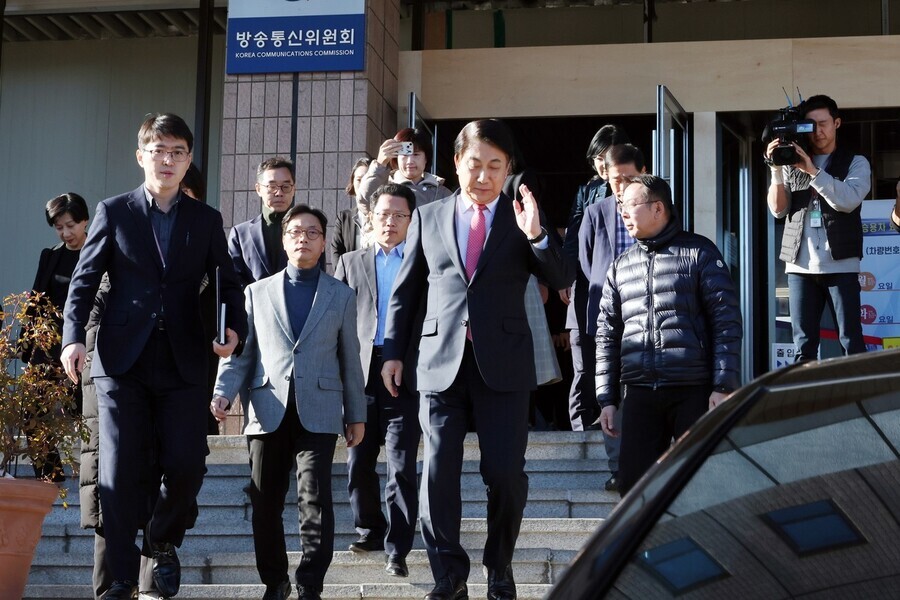hankyoreh
Links to other country sites 다른 나라 사이트 링크
KCC chief resigns to avoid impeachment, the second in 7 months

Kim Hong-il resigned from his position as the chairperson of the Korea Communications Commission (KCC). After following the footsteps of his predecessor, Lee Dong-kwan, by railroading all important items through without the necessary approval, Kim chose to step away from the position to avoid suspension after an impeachment bill was introduced to the National Assembly. It took only seven months for history to repeat itself.
Kim handed in his resignation on Tuesday morning, which President Yoon Suk-yeol signed off on immediately. Lee Jin-sook, the former head of MBC’s Daejeon branch, is said to be one of the likely candidates to take up the position.
After resigning to avoid impeachment, Kim will likely appoint a successor immediately, demonstrating the KCC’s determination to uphold its “two-person rule” despite controversy.
“My resignation will prevent a worrying situation in which, thanks to the impeachment bill introduced by the opposition party, broadcasting, telecommunications, and media policies that impact people’s lives daily come to a prolonged standstill,” Kim said during his resignation ceremony at the government complex in Gwacheon.
He added that the attempt to impeach him was no more than a “political ruse to paralyze the operations of the KCC by suspending [him] from office.”
Kim becomes the second chairperson of the KCC, appointed by Yoon himself, to resign voluntarily. On Dec. 1, 2023, Lee Dong-kwan resigned ahead of a plenary vote on an impeachment bill against him. Only six months into the job, Kim, who was appointed as Lee’s successor on Dec. 29, also chose to resign before being impeached.
The Democratic Party and four other opposition parties introduced the impeachment bill on Thursday, claiming that Kim had illegally run the commission through a “two-person system,” in which important items were forced through by two KCC commissioners, instead of the required five. If the impeachment bill passes, Kim will be suspended from office until the Constitutional Court makes a decision.

On Friday, the day after the impeachment bill was introduced, Kim approved a plan to appoint board members for South Korea’s major broadcasters, including the Foundation for Broadcast Culture, the largest shareholder of MBC. He resigned four days later.
With three broadcasting bills for amending the Broadcasting Act, the Foundation for Broadcast Culture Act, and the Korea Educational Broadcasting System Act being led by the opposition to reorganize the governance of public broadcasting, the KCC rushed to replace the FBC director, whose term will expire in August.
Much like how Kim put the finishing touches on his predecessor’s work to privatize YTN on Feb. 7, the replacement of the FBC chair will be completed by the next KCC chairperson.
“I am horrified by the administration’s determination to control the press, even if they have to sacrifice the heads of state-level institutions in order to achieve their goal,” said Yoon Chang-hyun, the chief of the National Union of Media Workers, during a press briefing held by a coalition of media groups condemning attempts by the government to rein in the press. “The government’s behavior is precisely why we must rebuild the Broadcasting Act in its entirety.”
By Park Kang-su, staff reporter
Please direct questions or comments to [english@hani.co.kr]

Editorial・opinion
![[Column] Is Korean democracy really regressing? [Column] Is Korean democracy really regressing?](https://flexible.img.hani.co.kr/flexible/normal/500/300/imgdb/original/2024/0705/2917201664129137.jpg) [Column] Is Korean democracy really regressing?
[Column] Is Korean democracy really regressing?![[Column] How tragedy pervades weak links in Korean labor [Column] How tragedy pervades weak links in Korean labor](https://flexible.img.hani.co.kr/flexible/normal/500/300/imgdb/original/2024/0703/8717199957128458.jpg) [Column] How tragedy pervades weak links in Korean labor
[Column] How tragedy pervades weak links in Korean labor- [Column] How opposing war became a far-right policy
- [Editorial] Korea needs to adjust diplomatic course in preparation for a Trump comeback
- [Editorial] Silence won’t save Yoon
- [Column] The miscalculations that started the Korean War mustn’t be repeated
- [Correspondent’s column] China-Europe relations tested once more by EV war
- [Correspondent’s column] Who really created the new ‘axis of evil’?
- [Editorial] Exploiting foreign domestic workers won’t solve Korea’s birth rate problem
- [Column] Kim and Putin’s new world order
Most viewed articles
- 1[Column] Is Korean democracy really regressing?
- 2Beleaguered economy could stymie Japan’s efforts to buoy the yen
- 3Real-life heroes of “A Taxi Driver” pass away without having reunited
- 4South Koreans living near border with North unnerved by return of artillery thunder
- 5What will a super-weak yen mean for the Korean economy?
- 6Car behind deadly crash began rapid acceleration after exiting underground garage
- 7In the blink of an eye, an unthinkable crash turned a night out into a nightmare
- 8Shoddy records help Korean hospitals conceal abuse of mentally ill
- 9Experts cast doubt on driver’s claim that sudden unintended acceleration caused deadly crash
- 10[Column] How tragedy pervades weak links in Korean labor